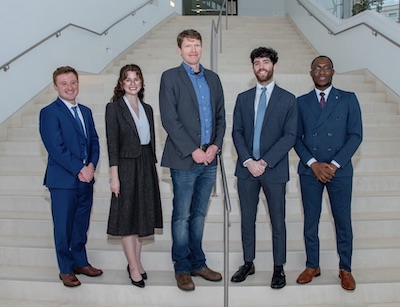Students explore how to apply legal training to public service on a global stage
The Salzburg Cutler Fellows Program focuses on how international law and legal systems can tackle challenges ranging from human rights to climate change.

Four Duke Law students joined peers from 13 other top law schools to explore how international law can help shape a more just global society at the 11th annual Salzburg Cutler Fellows Program: The Future of Public and Private International Law. Mujib Jimoh LLM ’23, Rebecca Mooney JD/LLM ’24, Liam Murray JD/LLM ’23, Connor Sakati JD/MPP ’24, and faculty representative Professor Timothy Meyer traveled to Washington, D.C., where they engaged with prominent legal professionals, public servants, and leaders in the fields of international law and public service and participated in discussions focused on legal challenges facing the international community and career paths in public service.
In advance of the program, held Feb. 16-18, Cutler Fellows prepared working papers on emerging questions in international law, including space law, cyber surveillance, war debt, Russia’s war in Ukraine, gender-based violence, and climate law. They received feedback on their papers from peers during workshops facilitated by faculty members of participating law schools, who also gave advice on how to refine them for eventual publication.
“This year’s Cutler Fellows were exemplary representatives of Duke,” said Meyer, the Richard Allen/Cravath Distinguished Professor in International Business Law.
“The papers they presented at the workshop were among the best of a range of high-level papers from students at the top law schools in the U.S. The opportunity to mingle with peers from the same schools will also lay the foundation for their professional networks in international law for years to come.”
In the program’s Knowledge Café sessions, students discussed personal ambitions and potential career routes with mentors in international law including Katrin Kuhlmann, visiting professor of law and faculty co-director of the Center on Inclusive Trade and Development at Georgetown Law Center; Barbara Medrado, associate on the international trade team at King & Spalding; Gomiluk Otokwala, senior counsel at the International Monetary Fund; and Thomas Weatherall, attorney-adviser in the Office of the Legal Adviser for Human Rights and Refugees at the U.S. Department of State.
“The Salzburg Global Seminar was a phenomenal opportunity to connect with preeminent scholars and advocates in public international law,” Mooney said.
“Between panels and coffee breaks, we discussed the importance of international accountability, maintaining a rule-based legal order, and preserving hope in conflict landscapes. I am thankful to have found such a vibrant community of rising lawyers who share my personal and professional interests in international law and am confident that we will continue to cross paths for years to come.”
Mooney’s paper evaluates the legality, under international human rights law, of restrictions the Trump administration placed on Guantánamo Bay detainees’ ability to create and display art. Finding the United States in violation of its treaty obligations, she argues the Biden administration should reverse the restrictions in favor of freedom of rehabilitative, artistic expression.
Mooney, who was inspired to write the paper from her experience with Guantánamo detainee habeas work before law school, said she received helpful feedback from peers and from Saira Mohamed, former Attorney-Adviser for Human Rights in the State Department’s Office of the Legal Adviser. Beginning in May, she will be a summer associate at WilmerHale, founded by Cutler Fellows namesake Lloyd N. Cutler, and plans to pursue a career in international law and human rights after graduation.
This year’s program included three panels of experts discussing timely international law topics. The first panel examined the war in Ukraine and accountability in the international system and featured Mark Ellis, executive director of the International Bar Association; Robin Dunnigan, U.S. Deputy Assistant Secretary for the Bureau of European and Eurasian Affairs; and Ambassador William Taylor, VP of Russia and Europe at the United States Institute of Peace. The conversation covered topics such as the U.S. administration’s assistance to Ukraine to the power and limitations of the International Criminal Court.
Another panel focused on the evolution of climate law and policy and the crucial role of climate advocacy in coming years. Speakers were Leslie Fields, national director of policy, advocacy, and legal at the Sierra Club, and Ambassador Daniel Feldman, partner at Covington & Burling and former chief of staff and counselor to U.S. Secretary of State John Kerry.
A third panel on human rights featured Stavros Lambrinidis, EU Ambassador to the U.S. and former EU Special Representative for Human Rights, and Roya Rahmani, senior advisor at the Atlantic Council and former Afghanistan Ambassador to the U.S. and Indonesia. The conversation underscored the importance of developing institutions that support long-lasting human rights efforts and adapting human rights approaches to the communities they serve.
The Salzburg Cutler Fellows Program is held under the auspices of the Lloyd N. Cutler Center for the Rule of Law. The 14 law schools taking part in the program this year were UC Berkeley, University of Chicago, Columbia, Cornell, Duke, Georgetown, Harvard, University of Michigan, NYU, Northwestern, University of Pennsylvania, Stanford, University of Virginia, and Yale.